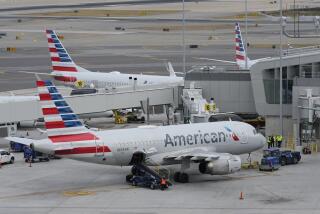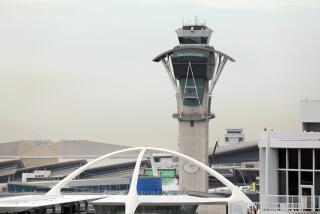By catering to ‘elite’ fliers, American Airlines misleads others
Do airlines deliberately withhold seats until the last minute to get you to splurge on pricier options?
Along the same lines, do airlines create a false impression that a flight is rapidly selling out so you’ll jump on any seat available, no matter the cost?
The answers, according to the airline industry, are no and no.
Travelers might have another opinion.
The topic arises as airlines fiddle yet again with prices and fees. Southwest Airlines said Friday that it will start charging a fee next year for customers who miss a flight but fail to cancel their reservation. The carrier hasn’t said how much the fee will run.
American Airlines, meanwhile, last week unveiled a new fare structure that will allow coach passengers to dodge a pesky $150 fee to change a booking. But that’s only if you agree to pay up to $88 more for your ticket. I’ll get back to that in a moment.
Quiz: Test your knowledge about airport security
First, let’s meet Dan Cohen, who had a recent run-in with American that paints a decidedly unflattering picture of how the airline treats customers — and perhaps goes a long way toward explaining why American’s parent, AMR Corp., has been plodding through bankruptcy proceedings for more than a year.
Cohen, 58, is an Emmy-winning documentary filmmaker whose latest effort, “An Article of Hope,” is scheduled to appear next month on PBS. The executive producer of the film, about Israeli astronaut Ilan Ramon, was Tom Hanks.
Cohen has been tweaking the film right up to the finish line. He had to fly from his home in Maryland this month to shoot some last-minute footage in Los Angeles. It was a quick trip — arrive Saturday, work Sunday, return Monday.
He booked the roughly $250 round-trip ticket on the travel site Expedia. For the flight to L.A., no problem. Cohen went to American’s website and reserved a seat without any trouble.
For the flight back to Maryland, however, the airline’s site showed that only five seats were open, and each required a nearly $42 upgrade fee.
“I figured, holy smokes, I better buy my seat right away or I’m not going to get one,” he said. “They obviously were selling out or were overbooking the flight.”
So Cohen paid the extra fee and reserved his seat. On the morning of his return flight, he went back to American’s website to print his boarding pass, and, lo and behold, there were now 20 seats open — and more than half didn’t require an extra fee.
In fact, one of the seats that had previously been listed as requiring an upgrade was now available at the regular price.
“It was a bait-and-switch,” Cohen said. “Their seating chart on their own website clearly didn’t represent the actual seats available.”
Well, what if a bunch of people had simply canceled at the last minute?
“No way,” Cohen replied. “The flight was completely full. It’s hard to believe there were that many cancellations just a few hours before takeoff.”
Insult to injury: When he asked for a refund of that upgrade fee at the airport, the airline rep said she couldn’t do anything to help.
It all looked pretty fishy. So I got in touch with Jim Faulkner, a spokesman for American Airlines.
“The reason seats appeared unavailable two days prior to the flight and then became available on the day of departure is due to the elite seat blocking/reservation process,” he explained.
You’re “elite” in American’s eyes if you qualify for one of the carrier’s top frequent-flier categories, such as Executive Platinum or Gold. That’ll get you various perks, such as ticket upgrades and priority check-in.
“American saves seats for our valued elite customers, who typically have a shorter booking window than other customers,” Faulkner said. “When those seats go unfilled by elite customers, they become available for selection by any customer during the check-in window.”
What about that one seat that had magically transformed from a premium seat to a regular seat? Faulkner attributed that to complex algorithms that do that kind of thing.
Needless to say, this is a pretty hinky way of doing business. The system does seem designed to spook you into spending money for unnecessary upgrades.
Moreover, American could certainly do a better job of disclosing that the number of seats offered at any given moment may not actually reflect the true number of seats available.
I get that a business wants to reward its most loyal customers, its “elites.” But that shouldn’t entail deceiving everyone else.
And about that new fare structure: American might want to rethink how it’s now offering three tiers of coach tickets.
Travelers can buy a bare-bones ticket and still face the $150 change fee and a $25 baggage fee each way. Or they can pony up an extra $68 to avoid the change fee and check a bag round-trip without an additional charge free.
For an extra $88 instead of $68, travelers can get both those perks, plus some airline miles, plus some booze on the flight.
Figure it like this: If you’re checking a bag on both legs of a round trip, you’re already facing $50 in fees. What’s an additional $18 or $38 for the peace of mind of knowing you won’t get slapped with a $150 fee if you have to change a booking?
Or so American seems to be hoping you’ll think.
What they’re really doing is threatening passengers with an unconscionably large penalty for reservation changes, even though the airline, like most airlines, routinely overbooks flights so it won’t be inconvenienced by such things.
And to alleviate that threat, they’re offering the opportunity to pay up to $38 more per ticket. If Tony Soprano did this, we’d call it a protection racket.
Not a very elite way to behave at all.
David Lazarus’ column runs Tuesdays and Fridays. He also can be seen daily on KTLA-TV Channel 5 and followed on Twitter @Davidlaz. Send tips or feedback to david.lazarus@latimes.com.







